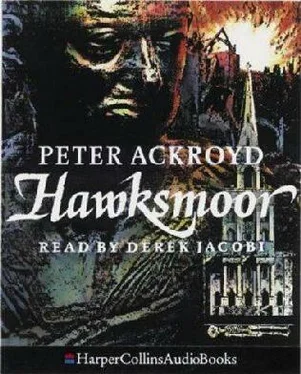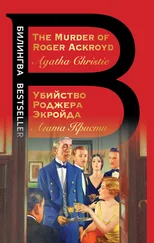Walter rose to leave: 'It doesn't look as if he's coming back, does it?'
Mrs West shook her head. 'No he's out again for the night if I know him.' And Walter wondered what she meant. 'You can come again,' she said as he left the flat. Then she went to her window and watched him as he walked away, her hands drumming against her sides.
And it was not long after that Hawksmoor returned. When he opened the door of his flat, the full weariness of the evening hit him: he longed for sleep, since there was something screaming within him which needed to be laid to rest. The lights of Grape Street were reflected in his dark room, and he had only just entered it when he shrank back in alarm: something was sitting, or crouching, in the corner. He turned on the light quickly, and saw that it was only a jacket he must have flung there. 'My second skin,' was the phrase which occurred to him, and he repeated it softly to himself as he prepared for sleep. Then he dreamed, as others do, although he had learned how to forget his dreams.
The next morning he was sitting in his office, his back to the light, when Walter came in whistling. 'Don't you knock,' he asked, 'before you walk in?'
Walter paused until he saw that he was smiling. 'I called at your flat last night, sir, to tell you the news.' For some reason Hawksmoor blushed but, since he said nothing, Walter continued -although more hesitantly than before. 'It's as we expected, sir.' He laid some papers down on Hawksmoor's desk. The only blood and tissue groups were from the victim. Nothing at all off the other one, the assailant.'
'And did the other one leave no prints or marks?'
'As I said, nothing at all.'
'Doesn't that strike you as odd?'
'It's unusual, sir.'
'Good thinking, Walter.' Hawksmoor put on his glasses and pretended to examine the papers which Walter had brought to him. 'I want you to type out a report for me,' he said at last, 'and I want you to address it to the Assistant Commissioner. Put in all the usual details date and time of discovery, list of responsible officers, you know what I mean.' He leaned back and took off his glasses: 'And now, Walter, I will give you the facts as I understand them'.
And these were the facts, as far as anybody understood them at this time. On the evening of November 17 in the previous year, the body of a boy later to be identified as Thomas Hill, who had been missing from his home in Eagle Street for seven days, was discovered in one of the passages of the abandoned tunnel by Christ Church, Spitalfields: he had been strangled, apparently by hand since there were no ligature marks around the neck; and several ribs were broken which, with internal bruising, suggested that he had fallen from a height of at least thirty feet. Despite the most exhaustive examination, however, no trace of his murderer had yet been found -certainly no print marks, and no particles of the killer's clothes, were discovered anywhere in the vicinity. A thorough search of the grounds and of the tunnel had revealed nothing but a bus-ticket, and some pages torn from one of the many religious pamphlets on sale in the church itself: no significance could be attached to any of these items. House-to-house enquiries had been equally unsuccessful and, although certain suspects had been closely questioned, no real evidence of guilt was forthcoming. Then on May 30 of this year a vagrant known as 'Ned', but whose real name was Edward Robinson, was found by the door of the crypt beneath S t Anne's Limehouse; it was assumed at first that in a drunken stupor he had fallen down the steep flight of steps which lead to the crypt, but forensic examination revealed that he had been strangled -again no trace of the murderer was found upon the tramp or in the surrounding grounds. The only possible clue to the killer's identity was a photograph, very badly creased and damaged but apparently that of a small child, which had been found in a pocket of the vagrant's overcoat.
There was no reason to connect this killing with the murder of Thomas Hill six months previously, and in fact it might have been safe to assume that Edward Robinson had been a victim of one of the innumerable and often violent quarrels which break out between those inhabitants of the area known to the police as 'transients'.
Exhaustive questioning, however, had revealed no evidence of a fight or quarrel. The absence of prints or saliva upon the dead man had once more baffled the forensic scientist, and it was he who eventually surmised that there was a 'comparability factor' between the two cases. And then on August 12 of this year the body of a small boy, Dan Dee, was discovered in the ground behind St George's-inthe-East, Wapping. It transpired that the victim had left his house in Old Gravel Lane around six the previous evening in order to join his friends in a game of football beside the Tower Hamlets Estate; when he had not returned by eleven, his anxious parents contacted the police but it was not until the following morning that a constable had found the child's corpse lying beside an abandoned shelter in the grounds of the church. He had been strangled, apparently by manual means, but again no prints were found on the neck or body. House-to-house enquiries, a thorough search of the grounds, and exhaustive forensic tests had revealed nothing: an unhappy fact which Hawksmoor now added to the end of his report.
He could not help smiling as he recounted the details of these murders, and by the time he had finished he felt quite calm. 'So you see, Walter,' he said in a lower tone now, 'We live in the shadow of great events'. And then he added: 'If only we knew what they were.'
'He must be a madman, sir, mustn't he?'
Hawksmoor looked down at his hands, placed flat upon the desk: 'Don't assume that.'
'But I can assume he's dirt!'
'But the dirt needs the cleaner and the cleaner needs the dirt.' He drummed the fingers of his right hand on the desk. 'And tell me, Walter, tell me what else you think.'
'You mean, what do I think is the story?'
'We have to assume there is a story, otherwise we won't find him, will we?' His hand was still once more.
'It's difficult to know where to begin, sir.'
'Yes, the beginning is the tricky part. But perhaps there is no beginning, perhaps we can't look that far back.' He got up from his desk and went over to the window, from where he could see a thin pillar of smoke rising into the clouds. 'I never know where anything comes from, Walter.'
'Comes from, sir?'
'Where you come from, where I come from, where all this comes from.' And he gestured at the offices and homes beneath him. He was about to say something else but he stopped, embarrassed; and in any case he was coming to the limits of his understanding. He was not sure if all the movements and changes in the world were part of some coherent development, like the weaving of a quilt which remains one fabric despite its variegated pattern. Or was it a more delicate operation than this -like the enlarging surface of a balloon in the sense that, although each part increased at the same rate of growth as every other part, the entire object grew more fragile as it expanded? And if one element was suddenly to vanish, would the others disappear also -imploding upon each other helplessly as if time itself were unravelling amid a confusion of sights, calls, shrieks and phrases of music which grew smaller and smaller? He thought of a train disappearing into the distance, until eventually only the smoke and the smell of its engine remained.
He turned from the window, and smiled at Walter: 'I'm sorry, I'm just tired'. There was a noise in the corridor outside, and abruptly he walked back to his desk. 'I want new men brought in,' he said, 'add that to the report. The others are getting nowhere, and I don't like their methods -' he could see once again the chaos in the Incident Room, and the detective with the cigarette hanging from his mouth 'And next time, Walter, next time tell them nothing is to be moved, nothing at all!'
Читать дальше












